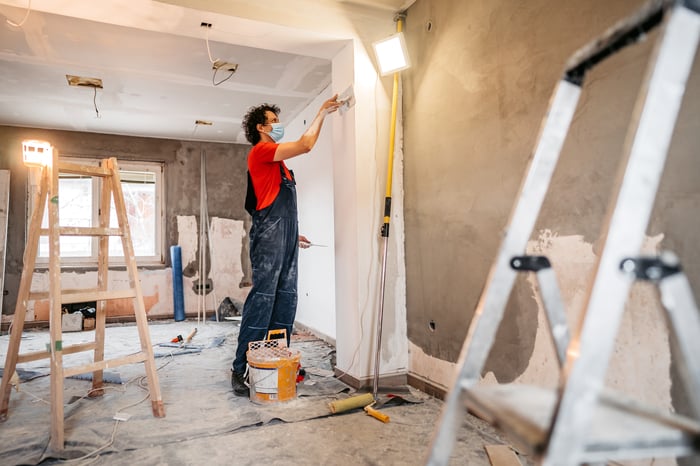If you're a fan of reality TV, you may have seen one of those shows where a couple of people come in and turn a property in disarray into a masterpiece. It's a concept known as house flipping, and it's one of many ways to break into the world of real estate investing.
Flipping houses can be a profitable endeavor -- just as profitable as buying stocks or other popular investment choices. But there's a lot of risks involved, so ask yourself these questions to determine whether it's right for you.

Image source: Getty Images.
1. Do I have the capacity to deal with surprise costs?
When you buy a home to flip, you're generally talking about buying a property that's seen much, much better days. And as such, the work involved may be far more than just cosmetic.
You can budget for things like ripping out dated countertops and putting in new flooring. But it's trickier to budget for complex updates, like rewiring a home or rerunning piping. Also, as you get deeper into your renovations, you could uncover additional costly issues, from mold to termite damage to foundation problems.
These are all things you'll need to be able to tolerate if you're going to get into the business of flipping houses. And if you're a naturally risk-averse person, that may not be something you're up for.
Additionally, you'll need to make sure you have the financial means to grapple with unplanned renovation costs. That could mean dipping into your personal savings, taking out loans, or tapping the equity you have in other properties you own. Either way, you'll need a plan before getting started with house flipping.
2. Do I have the right resources for the job?
Even if you're relatively handy, you may not be able to handle an entire house flip on your own. Before you buy a home to flip, figure out how you'll get the work done. It may be that you're capable of putting up sheetrock and sanding floors but possibly need to bring in a licensed plumber or electrician to handle some of the more technical work involved.
And it's not just building professionals and contractors you might need in your corner to be successful at house flipping. You'll also need a great real estate agent to partner up with. Make sure you have all the right people in place before buying a home to flip. And if you're not confident in that regard, hold off.
3. Is there a different real estate investment I'm more comfortable with?
If you're used to buying stocks and bonds but not flipping houses, investing in REITs (real estate investment trusts) may be a better way to dip your toes into the world of real estate investing. With REITs, you don't have to take on the risk of owning physical properties yourself.
Even if you are up for buying actual properties, flipping them isn't your only option. You could buy an income property and rent it out on a short- or long-term basis, making renovations and repairs only as necessary. That could, in many cases, be a less risky prospect than buying a home ridden with issues in the hopes of fixing it up on the relatively cheap and selling it at a profit.
Should you try house flipping?
There's plenty of money to be made in house flipping. But that doesn't mean it's automatically right for you. Before diving in, talk to people who have flipped homes before and learn more about their experiences. The outcomes you see on those reality TV shows don't necessarily reflect the struggles of your typical house flipper, so don't be tricked into thinking it's a glamorous business to be in.






